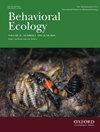在沼泽生态系统中,捕食者-猎物相互作用决定了个体的生存
IF 2.5
3区 环境科学与生态学
Q2 BEHAVIORAL SCIENCES
引用次数: 0
摘要
捕食者-被捕食者相互作用构成了生态群落的结构,人格在这种相互作用中起着重要的调节作用。个性表现往往取决于社会背景,这表明群体个性可能是决定捕食者遭遇结果的关键。在这里,我们测试了个体个性和群体组成对沼泽长尾花(Littoraria irrorata)生存的影响,当暴露于其主要捕食者蓝蟹(Callinectes sapidus)时,两者都是调节盐沼生态系统生产力和健康的重要参与者。蜗牛被分为大胆或害羞的性格类型,这与壳的长度无关,尽管当单个蜗牛暴露在捕食者面前时,这两种特征都不会影响它们的生存。然而,当蜗牛被分成不同个性组成的小组时,有大胆个体的小组的蜗牛存活率高于没有大胆个体的小组。虽然群体类型对大胆蜗牛的存活率没有影响,但害羞蜗牛在混合群体中的表现更好:少数大胆个体的存在对降低害羞蜗牛的死亡率特别有效。因此,人格对捕食者逃脱的影响取决于群体人格构成,这表明社会环境可以直接影响其个体成员的生存和成功,对社区动态具有广泛的影响。本文章由计算机程序翻译,如有差异,请以英文原文为准。
Individual survival is dictated by group personality in a marsh ecosystem predator–prey interaction
Abstract Predator–prey interactions structure ecological communities, and personality can significantly mediate these interactions. Personality expression is often contingent on social context, suggesting that group personality may be key in determining the outcomes of predator encounters. Here, we test the influence of individual personality and group composition on survival of the marsh periwinkle, Littoraria irrorata, when exposed to its main predator, the blue crab, Callinectes sapidus, both integral players in mediating the productivity and health of salt marsh ecosystems. Snails were categorized as having bold or shy personality types, which were unrelated to shell length, though neither trait influenced survival when individual snails were exposed to a predator. However, when snails were partitioned into groups differing in personality composition, snails in groups with bold individuals had higher survival than those in groups with none. While group type did not influence the survival of bold snails, shy snails performed better in mixed groups: the presence of a few bold individuals emerged as especially effective in decreasing mortality of shy snails. The effect of personality on predator escape is thus conditional on group personality composition, indicating that social context can directly impact the survival and success of its individual members, with broad implications for community dynamics.
求助全文
通过发布文献求助,成功后即可免费获取论文全文。
去求助
来源期刊

Behavioral Ecology
环境科学-动物学
CiteScore
5.20
自引率
8.30%
发文量
93
审稿时长
3.0 months
期刊介绍:
Studies on the whole range of behaving organisms, including plants, invertebrates, vertebrates, and humans, are included.
Behavioral Ecology construes the field in its broadest sense to include 1) the use of ecological and evolutionary processes to explain the occurrence and adaptive significance of behavior patterns; 2) the use of behavioral processes to predict ecological patterns, and 3) empirical, comparative analyses relating behavior to the environment in which it occurs.
 求助内容:
求助内容: 应助结果提醒方式:
应助结果提醒方式:


